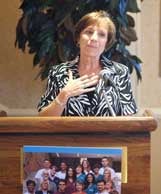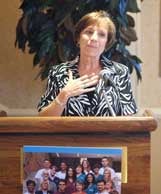 KINGSTON, R.I. – September 24, 2013 – A national expert on the role of nurses in improving health care asked two tough questions of the 200 participants at a nursing summit in Providence earlier this month.
KINGSTON, R.I. – September 24, 2013 – A national expert on the role of nurses in improving health care asked two tough questions of the 200 participants at a nursing summit in Providence earlier this month.
“Do we have the best health care in the world?” asked Susan B. Hassmiller, senior adviser for nursing at the Robert Wood Johnson Foundation. “No. Do our people live longer than those in other countries? No, we are ranked 23rd in life expectancy.”
Yet the United States has the most expensive health care system in the world. But Hassmiller and other health care experts said during the summit that nurses are a major part of the solution to problems of cost and quality.
Hassmiller’s keynote address followed a panel discussion involving Angela Patterson, chief nurse practitioner officer for CVS Caremark MinuteClinic; Daniel Kertzner, vice president for grant programs at the Rhode Island Foundation; Peter Fontaine, a registered nurse and health care entrepreneur, Laurie White, president of the Greater Providence Chamber of Commerce and Edward J. Quinlan, president of the Hospital Association of Rhode Island.
 The discussions were part of a one-day summit presented by The Rhode Island Action Coalition for the Future of Nursing, part of a national effort by the Johnson Foundation to build a more highly educated, diverse nursing workforce that will improve health outcomes for patients, families and communities.
The discussions were part of a one-day summit presented by The Rhode Island Action Coalition for the Future of Nursing, part of a national effort by the Johnson Foundation to build a more highly educated, diverse nursing workforce that will improve health outcomes for patients, families and communities.
Backed by a $150,000 Robert Wood Johnson Foundation grant, the Rhode Island coalition also received critical support from a $247,363 Governor’s Workforce Board Partnership Grant to Stepping Up, a health care industry partner of the workforce board. Lynne Dunphy, professor and interim associate nursing dean at URI and co-leader of the state’s action coalition, and the URI Foundation successfully raised additional funds from the Rhode Island Foundation, Blue Cross Blue Shield of Rhode Island and the Routhier Foundation.
“We want to bring rationality to the system,” Hassmiller said. “Nurses are a critical piece in the effort to reduce (medical) errors and improve care.”
Even as the national health care plan goes into effect, Hassmiller said cost, quality and access in this country need to be addressed.
One of the recommendations of the Institute of Medicine’s study on nursing is all Americans should have access to high quality family and community health care based in a system in which nurses contribute as essential partners, she said.
Nurses must be involved in decision-making, practice and career development, continuing and advanced education, interprofessional collaboration and efforts to improve diversity in the profession.
Hassmiller referenced former secretary of Health and Human Services Secretary Donna Shalala in saying that nurses must seek higher levels of education. “The majority of nurses practicing in this country have two-year degrees from community colleges. In other countries, baccalaureate preparation is the standard.”
During the earlier panel discussion, the hospital association’s Quinlan said 18,000 registered nurses practice in Rhode Island, with about a one third in hospitals.
He acknowledged that young nurses have found it difficult to enter hospital practice because the recession.
“But we also have historic interest in nursing,” Quinlan said. “Total applications to all of our nursing schools in the state are growing. But we are only accepting 12 percent of that pool, so you are getting the best and the brightest.”
With the aging population in Rhode Island, the intensity of the demands on nursing is only going to grow in hospitals, Quinlan said.
“Also, we have an aging nursing workforce, with half of all nurses over the age of 50 and one quarter over the age of 60,” Quinlan said.
Chamber President Laurie White, said nurses are the number one patient advocates.
To adequately prepare nurses, the proposed combined University of Rhode Island-Rhode Island College nursing facility at the Dynamo House in Providence must be a statewide priority, she said.
“The General Assembly, Gov. Chafee, Mayor Tavares, URI, RIC and the hospitals all back this plan,” she said. “This will be a catalyst and a magnet for an emerging health science educational cluster. It will put our nursing programs literally at the doorstep of the teaching hospitals.”
White said it will also be an important center for business start-ups with a health care focus, and it could build on the state’s reputation for leadership in neurosciences.
“We want the most motivated and highly educated nursing students, and this will help attract them.”
MinuteClinic’s Angela Patterson discussed her role overseeing clinical nursing and professional practice governance for the company’s more than 2,300 nurse practitioners and physicians assistants. The 690 walk-in MinuteClinics can be found in 25 states and District of Columbia, but not in Rhode Island. State law does not allow them in the Ocean State.
She said the clinics are primarily staffed by board-certified, master’s-degree trained nurse practitioners, with some locations using physicans assistants.
“Since their inception in (2000) the clinics have treated and assessed almost 17 million patients, and in the last two years, we have added 200 more clinics.”
Patterson said MinuteClinics provide most of their services during evenings and weekends. “We have found that most of our patients do not have primary care physicians. And up to 40 percent of the adults we see have elevated blood pressure.
“Our job is to get them the care and service they need,” Patterson said.
That means making referrals, connecting patients with primary care doctors and specialists, and, if necessary, making sure they get to the local hospital’s emergency room.
“We also recognize that we are one of the largest employers of nurse practitioners in the country,” she said. “And we need to support them. So we embed the same clinical tools and the same level of service from Boston to Texas.”
MintueClinics pay the cost of continuing education for their clinicians, and a team of physicians and nurse practitioners review 10 percent of patient visits.
“Our culture is one of shared governance, and nurses are in leadership positions throughout our company,” Patterson said. “We have over 100 contracts with universities and colleges across the country for preceptorships.”
Pictured above
NURSING IN THE FOREFRONT: Susan B. Hassmiller, senior adviser for nursing at the Robert Wood Johnson Foundation, discusses the impact of nursing on health care during a recent nursing summit in Providence. The discussions were part of a one-day summit presented by The Rhode Island Action Coalition for the Future of Nursing, part of a national effort by the Johnson Foundation to build a more highly educated, diverse nursing workforce that will improve health outcomes for patients, families and communities.
ALL ABOUT NURSING: Laurie White, president of the Greater Providence Chamber of Commerce, left, updates a statewide nursing panel in Providence recently about the URI-RIC nursing facility in Providence, while Angela Patterson, chief nurse practitioner officer for CVS Caremark MinuteClinic, looks on.
URI Photos by Joe Giblin.

